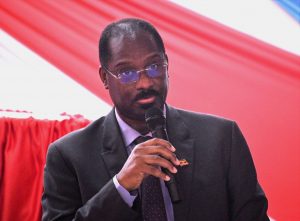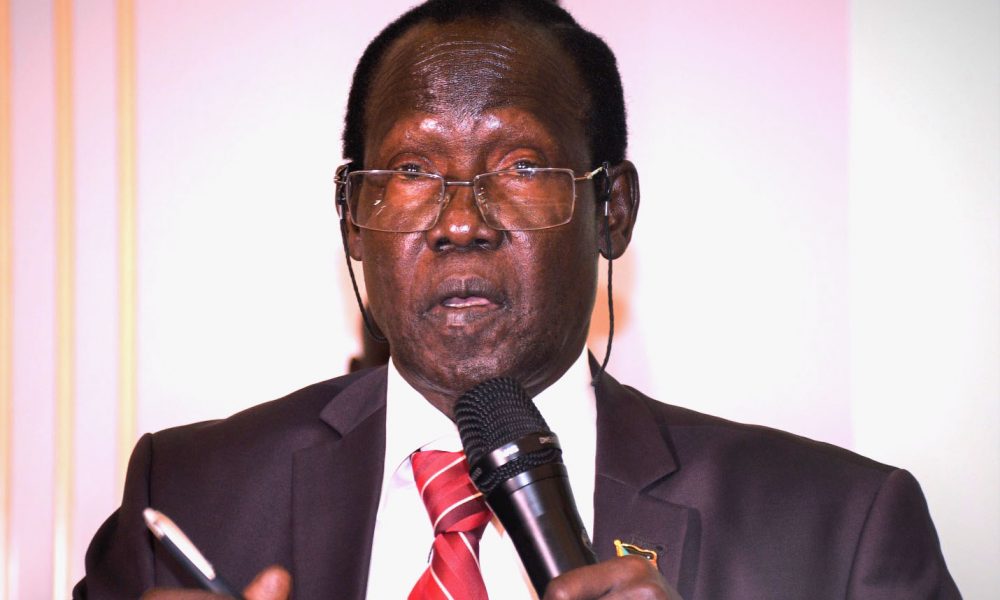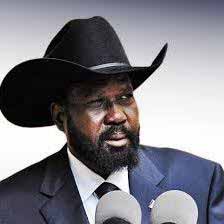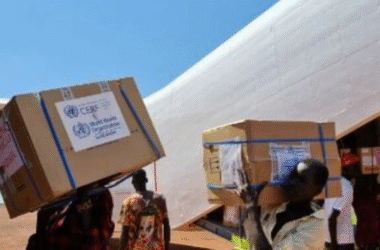By Bida Elly David
Vice President for Economic Cluster Dr. James Wani Igga has outlined insecurity, weak institutions, illiteracy and poor planning as major factors crippling South Sudan’s economy.
Addressing the National Economic Forum on Monday, VP Igga said insecurity has deterred foreign investors from establishing businesses in the country, despite South Sudan having abundant natural resources.
“Internal conflict among ethnic and tribal groups is an itching factor. Historically, clashes have been among tribes, but in recent years, conflict has added to child abductions, the activities of armed groups,” he said.
The Vice President stressed the lack of political will for conflict resolution and the rule of law as key factors affecting the economy.
He said improving security, peace and stability will be critical for citizens’ well-being and sustained poverty reduction.
“Issues of internal security must be addressed because it is the first and any other thing secondary,” he said.
Dr. Igga emphasized that a comprehensive approach is needed to deal with the causes of conflict within communities to ensure total peace and access to a sustainable economy.
“Adequate security is an essential prerequisite for a business environment that will attract a large amount of private investment capital to sustain strong economic growth,” he stated.
He further said the prolonged conflict and lack of quality education led to serious neglect in the development of infrastructures.
He said most public institutions are run by employees with little knowledge due to the high illiteracy level, hence affecting the economy.
“Our country carries the lowest adult literacy rate in rural areas in the whole world because we have been subjected to over 40 years of conflict and have no time for education,” he cited.
The Vice President suggested serious training and discipline for the national army to ensure security for citizens to access farms in rural areas.
“Continuous development of the capacity of South Sudan’s organized forces is paramount in this respect to improve security. Our government has taken obvious measures and tremendous steps to improve national security. Our government is doing and has been doing its level best to normalize the menace,” he added.
The government has taken steps to improve national security, but Igga stressed the need to end community disputes, engage in production, and deal with corrupt officials to end the mismanagement of public resources and ensure local enterprise dominance.

Brig: Gen Ronnie Balya, Ugandan Amb to South Sudan (Photo Bida Elly)
Meanwhile, the Ugandan Ambassador to Juba urged South Sudan leaders to tame corruption and political tension in the country.
Brig. Gen. Ronnie Balya, a representative of the Diplomatic Corps at the ongoing South Sudan Economic Conference urges leaders, instead to fight food insecurity in the country.
The Ugandan diplomat pointed that ignorance, corruption and conflict, hinder the development of South Sudan’s agricultural sector.
“Now that peace has returned to South Sudan, let us embrace this opportunity to expand trade, investment, and the revenue base,” he emphasized.
Amb. Balya urged South Sudan’s leadership to explore bilateral partnerships to widen development opportunities in the country.
“Let us focus on joint business in various sectors, including industry, agriculture, ICT, and services,” he added.
The diplomat also called on South Sudan to invest in the banking, education, hospitality, and tourism sectors in order to generate revenues and combat starvation in the country.
The Ugandan top diplomat views agriculture as the most important economic sector that can propel inclusive growth, saying, it should be valued.
In comparative analysis, the diplomat said South Sudan should learn from Uganda in developing the agricultural sector so that citizens don’t fully depend on salaries.
He said Uganda, as one of the East African countries, had put agriculture as a first priority among other things on account of the fact that it is life for all.
“The government should ensure this by empowering its people. Every family should be food and income secure,” he echoed.
He reiterated the need for the government to also increase household income to meet domestic needs, especially shelter, feeding, medical care, etc.
On the same note, he urged the government to save money for investment to multiply income for public service.
Brig. Balya emphasized that the South Sudan government needs sensitize citizens on family budgeting to manage resources and to avoid deficits.
“Every family should have a budget indicating income and expenditure. Have a calculation of what you put in production and what you will get out simply as input and output,’’ he said.
He said working only for the stomach without saving is very dangerous and risky to determine the future over the cost of budgeting.
“Everybody must highly participate in the market economy. You need to eradicate immunization and health care. You need good health for a country to be productive,” he underscored.
Balya further stressed the need to strengthen universal primary and secondary education, to defeat ignorance.
He added that improving infrastructure and other sectors are key areas to mend the crippling economy of South Sudan.
“Developing pipeline water, infrastructure development, electric energy, and roads with support from partners will change South Sudan,” he said.
“Let the people of South Sudan develop all their capacity to be able to stand on their feet again. You should walk away from subsistence agriculture and into commercialized and mechanized agriculture,” he continued.
The Ugandan ambassador called on the South Sudan government to avoid using political instability to disrupt the economy.



